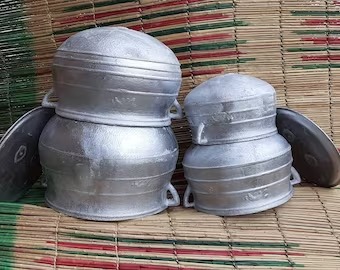
Audio By Carbonatix
A new study on nearly 200 consumer products and food samples across four regions in Ghana has revealed worrying levels of lead contamination in the popular metal cookware, 'dades3n'.
The Global Rapid Market screening study which happens to be the largest of its kind highlights alarming levels of lead in consumer goods and food produced in low and middle-income countries including Ghana with far-reaching global consequences.
The study conducted by the environmental NGO, Pure Earth’s Blacksmith Initiative revealed that there are high levels of lead contamination in the following: Metal cookware (Dades3n) is 55%, ceramic cookware has 18%, toys for kids has 14%, and cosmetics (local mascara) has 7% of lead.
According to a report launched by the World Bank recently, the levels of lead exposure are extremely high which leads to a decrease in IQ.
“Children under 5 years old worldwide lost 765 million IQ points, those living in low and middle-income countries lost 729 million IQ points.”
“There is an average loss of 5.9 IQ points per child and this IQ points loss is 80% greater than the previous estimate,” the report stated.
Country Director for Pure Earth, Esmond Wisdom Quansah also reiterated that eating from these metallic cookwares puts individuals at a high risk of lead poisoning.
According to him, the experiment was conducted six times and the results were the same hence the institution wants to create public awareness so that other alternatives may be considered to avoid further damage.

“What this points to is that we are not safe, if you happen to be eating from any of these metallic or ‘dades3n’ cookware we are at risk of lead poisoning.”
“We’ve grown a step further, our scientists have conducted what we call the leach test to determine the percentage of leach of this lead concentration in this metallic or aluminium cooking pot into the food and we were surprised by the findings of the scientists.”
"52% of the pots tested leached lead in concentrations greater than our reference level of 10 ug/L. The repeated leaching “boils” in pots in general resulted in lower lead in leachate, although lead remained above the 10 ug/L reference level in most cases, so that is a cause for concern for everyone and that is why we are putting this information in the public,” he explained.
Latest Stories
-
Gov’t to open enrolment for affordable homes under National Homeownership Fund
8 minutes -
Cashew farmers remind Mahama to fulfil promise to establish Cashew Development Board
15 minutes -
National Ambulance Service moves to acquire 400 new ambulances and 500 motorbikes
21 minutes -
Gov’t urges Ghanaian pilgrims to defer travel over Middle East tensions
27 minutes -
Ghana to create the largest converging centre for mineral discussions
33 minutes -
11 foreigners face trial over counterfeit dollar operation in Ga South
39 minutes -
GRIDCo chief leads team to inspect Genser’s Prestea Gas facility
46 minutes -
Minority Leader links push for cocoa price review to J.B. Danquah’s legacy
52 minutes -
Koforidua: Woman found guilty of manslaughter after pouring acid on boyfriend
58 minutes -
Ayawaso East voters to elect a new MP today
1 hour -
Interior Ministry clears 2025 rent allowance arrears for security services
1 hour -
Fire destroys shops at Kasoa Market as officers attacked during response
1 hour -
Minority introduces bill to tighten fiscal discipline in Ghana
1 hour -
NCCE calls for peaceful conduct of Ayawaso East by-election on Tuesday
1 hour -
Ghana’s nuclear projects in limbo; face delays over funding gap for critical studies
1 hour

